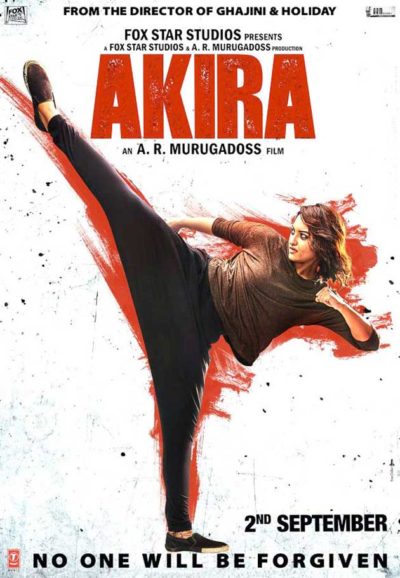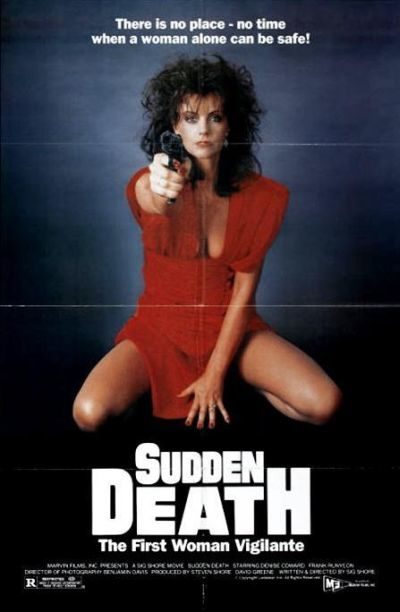Literary rating: ★½
Kick-butt quotient: ☆
“Poorly written, crypto-fascist vigilante wish-fulfillment.”
 I think it’s the “poorly written” aspect which I find most offensive. For I’m entirely down for some good ol’ entertainment in the form of justified violence, from Dirty Harry through Ms. 45 to Starship Troopers. But this… Oh, dear. The most stunning thing was discovering that this was the first in a series of twenty-seven novels in the “Sisterhood” series. Twenty-seven. I guess this proves there’s a market for this kind of thing, though I am completely at a loss as to who it might be. It certainly isn’t me.
I think it’s the “poorly written” aspect which I find most offensive. For I’m entirely down for some good ol’ entertainment in the form of justified violence, from Dirty Harry through Ms. 45 to Starship Troopers. But this… Oh, dear. The most stunning thing was discovering that this was the first in a series of twenty-seven novels in the “Sisterhood” series. Twenty-seven. I guess this proves there’s a market for this kind of thing, though I am completely at a loss as to who it might be. It certainly isn’t me.
The concept of the Sisterhood is a group of women, who have all suffered some kind of unpunished misfortune, and have been brought together to enjoy the vengeance which they have been denied by the official system. The ringleader is Myra Rutledge, who conveniently for the series is an extremely wealthy woman. She lost her daughter Barbara in an accident caused by a driver with diplomatic immunity, which inspired her into acction. Assisting is Nikki Quinn, her late daughter’s best friend, now adopted by Myra, who is a defense attorney; and a suave, British former MI-6 agent Charles Martin, who can apparently pull anything needed by the plot out of his suave, British arse.
There are various other characters, but they’re so poorly drawn as to be little more than ciphers, ranging from a securities broker, to a token Oriental, Yoko, who runs a flower shop (and it appears, turns out in later books to be great at martial arts. What are the odds?). The only one worthy of note is the wronged woman in this opening installment, is Kathryn Lucas, a truck driver who was brutally raped by three members of an upscale motorcycle gang, while her disabled husband (now deceased) was forced to watch. She didn’t bother to notify the authorities, for some unconvincing reason, and now the statute of limitations has expired. Naturally, They Still Must Pay – in this particular volume, with their testicles.
No, seriously. The convoluted plan hatched by Myra, Nikki and Charles involves some kind of contest involving the prize of a motorcycle, which will let them kidnap the culprits, castrate them in the back of a 16-wheeler converted into an impromptu operating room, and then dump them off with their now-separated family jewels. There is absolutely no part of this which is interesting, plausible or packs any kind of charge. You’d expect, or at least hope, that there would be some kind of dramatic arc here, but even Kathryn appears to achieve about as much closure from the retribution as would be gained by a trip to the supermarket. About the only plus is the lack of any real romantic subtext, though even here, I sense Nikki will be the source of much sexual tension down the road, with her district attorney ex-boyfriend, Jack.
I guess you could call it inspirational, in the sense that if this is the kind of rubbish which can lead to a 27-volume book deal, I’m inspired to take the same concept and knock up a bestseller over the course of this weekend. But otherwise, this is feeble nonsense – likely reaching its worst with the section where someone explains to Yoko, how to drive a manual transmission car. I should have given up at that point, and saved myself from further punishment.
Author: Fern Michaels
Publisher: Zebra, available through Amazon, both for Kindle and as a printed book.





 Like much horror, the rape-revenge genre is one which overlaps with, rather than being wholly encompassed by, the action-heroine field. Some entries qualify: the awesome glory which is Ms. 45 being the most obvious example. But others appear to focus more on the rape than the revenge, and are far less interesting as a result. Such was the case for the first two entries in this series – and, indeed, the 1978 grindhouse classic which it rebooted. Here, however, in an interesting twist we bypass the assault entirely. This starts instead with the victim in the earlier movies (Butler) having adopted a new identity, that of Angela, and attending both one-on-one therapy as well as group sessions.
Like much horror, the rape-revenge genre is one which overlaps with, rather than being wholly encompassed by, the action-heroine field. Some entries qualify: the awesome glory which is Ms. 45 being the most obvious example. But others appear to focus more on the rape than the revenge, and are far less interesting as a result. Such was the case for the first two entries in this series – and, indeed, the 1978 grindhouse classic which it rebooted. Here, however, in an interesting twist we bypass the assault entirely. This starts instead with the victim in the earlier movies (Butler) having adopted a new identity, that of Angela, and attending both one-on-one therapy as well as group sessions. The results of bringing female MMA fighters to the screen have been a bit mixed, shall we say. Gina Carano has looked decent in her films, but Ronda Rousey’s performances have been roundly criticized, and her Mile 22 project appears dead in the water. The performance by the recently retired from MMA Miesha Tate, which is likely the film’s major selling-point, rates… somewhere in the middle. She doesn’t disgrace herself – but that may be partly because there is no shortage of other weaknesses to criticize here. Tate is convincing in her role – yet since she’s playing a mixed martial-artist, it’s hardly proof of any acting ability. But I guess, everyone has to start somewhere, and a thinly-disguised version of yourself is a good place to begin.
The results of bringing female MMA fighters to the screen have been a bit mixed, shall we say. Gina Carano has looked decent in her films, but Ronda Rousey’s performances have been roundly criticized, and her Mile 22 project appears dead in the water. The performance by the recently retired from MMA Miesha Tate, which is likely the film’s major selling-point, rates… somewhere in the middle. She doesn’t disgrace herself – but that may be partly because there is no shortage of other weaknesses to criticize here. Tate is convincing in her role – yet since she’s playing a mixed martial-artist, it’s hardly proof of any acting ability. But I guess, everyone has to start somewhere, and a thinly-disguised version of yourself is a good place to begin. This is the first “true” modern Bollywood action heroine film I’ve seen, and has to be appreciated as such. While we’ve covered a couple of Indian films before, these have either been from outside the mainstream e.g. Bandit Queen, or have carefully corralled the action into socially-acceptable avenues, such as sport in Mary Kom. Neither is the case here, though the ending certainly has its share of hypocrisy, with the heroine being more or less sidelined, “for the greater good”.
This is the first “true” modern Bollywood action heroine film I’ve seen, and has to be appreciated as such. While we’ve covered a couple of Indian films before, these have either been from outside the mainstream e.g. Bandit Queen, or have carefully corralled the action into socially-acceptable avenues, such as sport in Mary Kom. Neither is the case here, though the ending certainly has its share of hypocrisy, with the heroine being more or less sidelined, “for the greater good”. Two stars might actually be a bit generous, on an objective scale. But I confess to possessing a soft spot for low-budget films made with passion, even if the results fall short. The most obvious deficiency here is the location shooting. Outside of an opening scene with a few ramshackle houses, the entire film takes place in a forest. Seriously, the closest thereafter we get to seeing any other buildings, is two people leaning up against a fence… in the middle of the woods. Maybe they should have called it Calamity Jane: The Wilderness Years, and set viewer expectations appropriately.
Two stars might actually be a bit generous, on an objective scale. But I confess to possessing a soft spot for low-budget films made with passion, even if the results fall short. The most obvious deficiency here is the location shooting. Outside of an opening scene with a few ramshackle houses, the entire film takes place in a forest. Seriously, the closest thereafter we get to seeing any other buildings, is two people leaning up against a fence… in the middle of the woods. Maybe they should have called it Calamity Jane: The Wilderness Years, and set viewer expectations appropriately. The star of this rape-revenge film, Denise Coward is a former beauty-queen, who was the second runner-up at Miss World in 1978, representing Australia. She didn’t exactly have a long movie career – this and sci-fi flick Galaxy representing roughly the sum total of it. Watching this, it’s easy to understand why, though it would require a significantly better actor than her to make a silk purse from the sow’s ear of a script and direction she is given here. Coward plays Valerie Wells, a career woman in New York who gets into the wrong taxi one night. For it has been stolen by a pair of low-lifes, who rape their passenger before dumping her unconscious body on the street. The cops, in particular Detective Marty Lowery (Runyeon) are sympathetic but over-worked, and Coward’s fiancé is about as much help as a chocolate teapot. What’s a girl to do?
The star of this rape-revenge film, Denise Coward is a former beauty-queen, who was the second runner-up at Miss World in 1978, representing Australia. She didn’t exactly have a long movie career – this and sci-fi flick Galaxy representing roughly the sum total of it. Watching this, it’s easy to understand why, though it would require a significantly better actor than her to make a silk purse from the sow’s ear of a script and direction she is given here. Coward plays Valerie Wells, a career woman in New York who gets into the wrong taxi one night. For it has been stolen by a pair of low-lifes, who rape their passenger before dumping her unconscious body on the street. The cops, in particular Detective Marty Lowery (Runyeon) are sympathetic but over-worked, and Coward’s fiancé is about as much help as a chocolate teapot. What’s a girl to do? Movie stunt-woman Laurie Collins (Chase) is out for the night with her sister, Bonnie, until the latter accepts the company of a young man. When things get more than a bit rape-y, and Bonnie ends up shooting her attacker dead. She is convicted of second-degree manslaughter, much to the chagrin of her sister. Worse is to follow after Bonnie is sent to prison, as there, she then falls foul of the jail’s top dog, Kay Butler (Martin). Bonnie soon turns up a corpse, with the incident written off as suicide, due to the heroine found in her veins. But Laurie doesn’t believe a word of it, and deliberately commits grand theft auto, among other crimes, in order to be sent to the same prison, where she can find those responsible, and make them pay for what they did to Bonnie.
Movie stunt-woman Laurie Collins (Chase) is out for the night with her sister, Bonnie, until the latter accepts the company of a young man. When things get more than a bit rape-y, and Bonnie ends up shooting her attacker dead. She is convicted of second-degree manslaughter, much to the chagrin of her sister. Worse is to follow after Bonnie is sent to prison, as there, she then falls foul of the jail’s top dog, Kay Butler (Martin). Bonnie soon turns up a corpse, with the incident written off as suicide, due to the heroine found in her veins. But Laurie doesn’t believe a word of it, and deliberately commits grand theft auto, among other crimes, in order to be sent to the same prison, where she can find those responsible, and make them pay for what they did to Bonnie. If you go in with expectations based on the poster, you are going to get two-thirds of the way into this and wonder if there was some mix-up. It’s only as the last act unfolds that the image makes sense – though it’s still somewhat of a misdirection. The main central character is actually Aram (Barreiro), a middle manager accountant stuck in a dull job, and an even less fulfilling marriage and family. He has a plan to break the monotony, which involves kidnapping a teenage girl, Anie (Vell), and Aram is plotting the crime with his trademark attention to detail.
If you go in with expectations based on the poster, you are going to get two-thirds of the way into this and wonder if there was some mix-up. It’s only as the last act unfolds that the image makes sense – though it’s still somewhat of a misdirection. The main central character is actually Aram (Barreiro), a middle manager accountant stuck in a dull job, and an even less fulfilling marriage and family. He has a plan to break the monotony, which involves kidnapping a teenage girl, Anie (Vell), and Aram is plotting the crime with his trademark attention to detail. Returning from a stint in the military, Rachel Baldwin (Kabasinski) is looking forward to reuniting and reconnecting with her family. But any hope of happiness is rudely disrupted when her niece slits her wrists in the bathtub. After the funeral, Rachel finds her late relative’s phone and realizes the reason for the suicide was a sex tape she’d made with her boyfriend (Wieczorek), which he had traded to a drug dealer for cocaine, and then ended up on the Internet, to her fatal shame. A thoroughly unimpressed Rachel decides to take her army skills and apply them to the sleazy individuals responsible, working her way up the ladder to Beverly (Hamblin), the woman at the top of the scumball chain of command.
Returning from a stint in the military, Rachel Baldwin (Kabasinski) is looking forward to reuniting and reconnecting with her family. But any hope of happiness is rudely disrupted when her niece slits her wrists in the bathtub. After the funeral, Rachel finds her late relative’s phone and realizes the reason for the suicide was a sex tape she’d made with her boyfriend (Wieczorek), which he had traded to a drug dealer for cocaine, and then ended up on the Internet, to her fatal shame. A thoroughly unimpressed Rachel decides to take her army skills and apply them to the sleazy individuals responsible, working her way up the ladder to Beverly (Hamblin), the woman at the top of the scumball chain of command. About to get married, Kira (Riddervold) and Marco (Campos) head out for a last quiet weekend together, at a luxurious cabin in the woods. Unfortunately, they become the target for the local rednecks and their kidnapping plot. This goes wrong, leaving Marco shot dead and Kira raped, then shot dead. Both bodies are buried in the woods, but – what are the odds? – it’s at the base of a tree where a native American woman was similarly slain by American soldiers in the mid-19th century. The spirit of that victim resurrects Kira out of her grave, in order for her to take her vengeance on those responsible.
About to get married, Kira (Riddervold) and Marco (Campos) head out for a last quiet weekend together, at a luxurious cabin in the woods. Unfortunately, they become the target for the local rednecks and their kidnapping plot. This goes wrong, leaving Marco shot dead and Kira raped, then shot dead. Both bodies are buried in the woods, but – what are the odds? – it’s at the base of a tree where a native American woman was similarly slain by American soldiers in the mid-19th century. The spirit of that victim resurrects Kira out of her grave, in order for her to take her vengeance on those responsible.